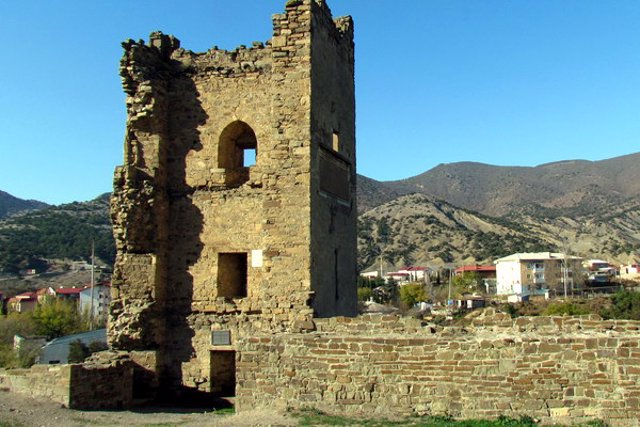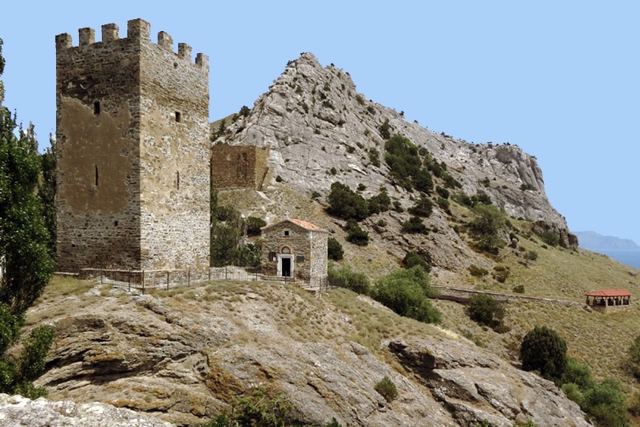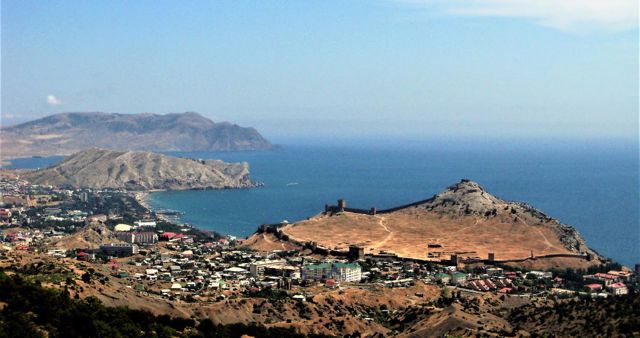Functional temporarily unavailable
General information about Sudak
City Sudak is a growing resort in the southeastern part of Autonomous Republic of Crimea, attracting tourists with ancient ruins, pleasant landscapes and sandy beaches.
The settlement of Sugdey ("Sughda" in Iranian means "immaculate, holy") was founded in the III century. Alans, ancestors of modern Ossetians. The official date of foundation is considered to be 212. Sugdeya falls under the rule of Byzantium, the construction of the fortress begins. Orthodoxy comes here, Christian churches and monasteries appear.
In Kyivan Rus, the city is known as the rich center of trade, Surozh. In the XIII century. the city was once again captured by the Tatar-Mongols, but in fact passed under the r ...
City Sudak is a growing resort in the southeastern part of Autonomous Republic of Crimea, attracting tourists with ancient ruins, pleasant landscapes and sandy beaches.
The settlement of Sugdey ("Sughda" in Iranian means "immaculate, holy") was founded in the III century. Alans, ancestors of modern Ossetians. The official date of foundation is considered to be 212. Sugdeya falls under the rule of Byzantium, the construction of the fortress begins. Orthodoxy comes here, Christian churches and monasteries appear.
In Kyivan Rus, the city is known as the rich center of trade, Surozh. In the XIII century. the city was once again captured by the Tatar-Mongols, but in fact passed under the rule of the Venetian Republic as Soldaya. In 1365 it was captured by the Genoese and became their independent colony under the protectorate of the consul Kafa. It fell into decay in the 15th century, after the conquest of the Crimea by the Ottoman Turks. After joining Russia, it develops as a center of winemaking, and the rapid resort construction began in the 1960s.
The climate is sharper than in the Yalta region, but this region of Crimea has the largest number of sunny days per year.
Судак - курорт в південно-східній частині Автономної Республіки Крим, який стрімко набирає популярність та приваблює туристів стародавніми руїнами, приємними ландшафтами та піщаними пляжами.
Поселення Сугдея ( "Сугда" по-іранських значить "невинний, святий") заснували у III столітті алани, предки сучасних осетин. Офіційною датою заснування вважається 212 рік. З VI століття Сугдея потрапляє під владу Візантії, починається будівництво фортеці. Сюди приходить православ'я, виникають християнські храми та монастирі.
У Київській Русі місто відоме як багатий центр торгівлі Сурож. У XIII столітті місто в черговий раз захоплено татаро-монголами, але фактично переходить під владу Венеціанської р ...
Судак - курорт в південно-східній частині Автономної Республіки Крим, який стрімко набирає популярність та приваблює туристів стародавніми руїнами, приємними ландшафтами та піщаними пляжами.
Поселення Сугдея ( "Сугда" по-іранських значить "невинний, святий") заснували у III столітті алани, предки сучасних осетин. Офіційною датою заснування вважається 212 рік. З VI століття Сугдея потрапляє під владу Візантії, починається будівництво фортеці. Сюди приходить православ'я, виникають християнські храми та монастирі.
У Київській Русі місто відоме як багатий центр торгівлі Сурож. У XIII столітті місто в черговий раз захоплено татаро-монголами, але фактично переходить під владу Венеціанської республіки як Солдайя. У 1365 році захоплене генуезцями і стає їх незалежної колонією під протекторатом консула Кафи. Занепадає в XV столітті, після завоювання Криму турками-османами. Після приєднання до Росії розвивається як центр виноробства, бурхливе курортне будівництво починається в 1960-х роках.
Клімат більш різкий, ніж в районі Ялти, але в цьому регіоні Криму реєструють найбільшу кількість сонячних днів на рік.
Сплануй своє перебування у Sudak
What to see and where to go in Sudak
Tourist attractions and museums of Sudak

Genoese Fortress
Castle / fortress
The Genoese fortress in Sudak is one of the best-preserved medieval fortresses in Crimea, a branch of the "Sofiya Kyivska" nature reserve in Kyiv.
The official date of the start of construction is 1371, but the Genoese began to build their fortress on the basis of an older fortification, which was laid by the Byzantines in the VI-X centuries (the oldest remains were found on the southern slope).
The Genoese fortress complex includes 20 towers, a barbican, a gate, a Christian temple, a mosque, barracks and other premises. In the complex of the second tier stands out the Consular tower-donjon, where the ruler of the city lived.
The legend of the daughter of the ruler of Suhdeya, who committed suicide by refusing to become the wife of a Pontic commander, is associated with the highest Watchtower (Divocha) tower. The round tower probably survived from Byzantine times. An exposition on the history of the Sudak Fortress has been opened in the premises of the mosque.

Maritime Fortification
Castle / fortress
The ruins of the former port area of the city of Sudak are near the sea under Castle Hill.
The defensive tower of Frederiko Astahver (Portova) has been preserved.
The small domed church of the Twelve Apostles is located next to it. At first it was Greco-Byzantine. It was destroyed twice and rebuilt again, the second time as an Armenian church. The walls of the temple were decorated with an interesting fresco painting depicting a secret supper (now the outlines of the figures are indistinct).
Reviews Sudak
Geographical information about Sudak
| {{itemKey}} | {{itemValue}} |
|---|---|
| Region |
Autonomous Republic of Crimea |




